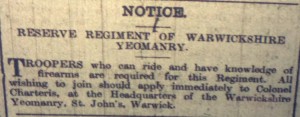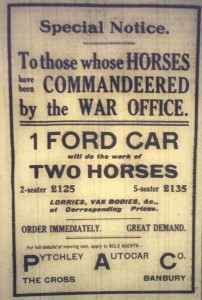Monthly Archives: September 2014
Sale. Manor House Farm, Shotteswell
The whole of the valuable
LIVE AND DEAD FARMING STOCK
Including: Herd of 107 cattle, comprising 70 Grand Fat 3½ year old Welsh heifers, 15 dairy cows and heifers (mostly down-calving or with calf at foot), 8 in-calf Welsh heifers, 12 barren heifers, and 2 calves; Flock of 125 Border Leicester Sheep, 5 Cart Horses, 2 Valuable Cart Mares and Foals, a 2 year old Cart colt, also a Capital Brown Pony, 6 year old quiet to ride and drive; Two sows and pigs, Fat Porker, Poultry, a collection of Agricultural implements, Dog-Cart, Rubber-tyred Ralli car, Market Float, Governess Car, Ladders, Harness, Dairy Utensils etc. also a portion of the excellent Household furniture.
WILL BE SOLD BY AUCTION, BY
MILLER AND ABBOTTS
On Tuesday, September 28th, 1914 by direction of Mrs George Corbett, who is relinquishing farming.
Luncheon at 10.30. Sale to commence at 11.30
The auctioneers wish to direct the attention of Cattle Dealers and Farmers to this Sale. The Welsh 3 year old heifers are fit for the butcher, the Dairy cattle excellent, and the whole of the cattle coloury and healthy. The Wether sheep are good meat, and the Lambs good sorted. The Horses are a useful lot, and the furniture substantial and well-made.
Catalogue can be obtained at the Place of sale, or of the Auctioneers, Banbury, Byfield and Bicester.
Banbury Guardian, September 1914
Farnborough Rural District Council
Mr W J Weld presided, and there were also present – Messrs A. Spencer, W. H. Jarvis, Ridley Brown, A. Fairfax (clerk), G. Elkington (surveyor), and J. Smith (inspector).
Financial – The Estimates
The Clerk said that the balance in hand was £244 8s 3d. and that Warmington and Shotteswell had paid in their calls. The accounts had been duly audited and found correct. He presented the estimates for the half-year, and said that the salaries, as usual amounted to £59 9s. 9d. The proportionate estimate of the surveyor was £97 2s 5d. and the stationery and sundries amounted to £30, which made £185 12s 2d. The credits were the contributions from the Warwickshire County Council £11,and from the local taxation account £102 13s 9d. which left £71 to be provided.
A penny rate produced £46 10s 5d and he suggested that the rate should be 2d in the pound, which would produce £93 0s 10d. They might have more expenses this half-year than usual.
Mr Spencer moved, and Mr Jarvis seconded that the rate be 2d in the pound, which was agreed to.
The Chairman said there would be a slight increase in the rateable value in his parish (Avon Dassett).
Water question at Wormleighton
The Chairman, addressing Mr Jarvis, said that Lady Stonham wanted leave to take the overflow from the water trough into her garden, and then allow it to go into the drain. He supposed the parish would have no objection.
This was all the business.
Wanted. Under Carter for Farnborough Estate
Wanted. Under Carter for Farnborough Estate.
Apply R. Holbech, Estate Office, Farnborough.
Banbury Guardian, September 1914
Belgian Refugees at Wroxton
Lord and Lady North, of Wroxton Abbey, have kindly given shelter to, and are providing for, a number of Belgian refugees. The first party arrived on Monday last week, Lady North meeting them at the station. The party consisted of eight persons, two men with their wives, and one child each, and two old ladies of sixty-five and sixty-six. They all come from Louvain, speaking French and Flemish. Just before the Germans arrived at Louvain, they were sent out of the town by order of the Burgomaster, and were ordered to take the train to Ghent. They stopped some days in Ghent, but here they were told they must go to Ostend, and from there to England. These poor refugees have lost all their possessions, as they had to leave everything behind, and since the Germans have burned Louvain, they have practically no hope of recovering anything. They have terrible stories to tell of things they heard when they were detained in Ghent, but most of these stories have been published in different papers. The second party arrived on Sunday afternoon, and Lady North again met them at the station. This party was made up of two mothers, one with one, and the other with two children, and a young girl of sixteen. They all come from Malines, and speak both French and Flemish; they left Malines railway station when the Germans were bombarding it. The would-be passengers hid in the cellars and tunnels of the station, and when a train was ready to leave, the station-master went into the tunnels and cellars, shouting sauve qui peut, and then there was a wild rush for the train. In one of these rushes they were separated from their husbands, whom they think must have gone to Holland. One can better imagine than describe, the troubles and anxieties and cares of these people, who have lost everything and have nothing but what they stand up in. However, everything is done to make them comfortable and happy, and one can see how extremely thankful they are for Lord and Lady North’s hospitality and kindness. Another party is shortly expected.
Banbury Guardian, September 1914
Wanted
At Michaelmas, a general Farm Labourer, with one or two sons. Good cottage, near to farm and village.
Apply H. Wadland, Avon Dassett, Leamington.
Newsflash!
Serbian victory at the Drina River
Newsflash!
German line in northern France holds at the Aisne
Special Notice to Those Whose Horses Have Been Commandeered by the War Office
Mons a “slaughterhouse” says Injured Royal Warwickshire Soldier
Eight soldiers of the Royal Warwickshire Regiment who were wounded at Mons on the 23rd ult. arrived in Leamington on Thursday evening on the way to their homes in Coventry. One of the men said that in the retirement from Mons the Royal Warwicks, the Lanceashires, and the King’s Royal Rifles got on the wrong tack. “We found ourselves in a slaughterhouse,” he added significantly. “There were 3,000 of us, and we were so overwhelmed by the German forces that we were ordered by our officers to look out for ourselves. I don’t know how I got away from it, but I know I shook hands with myself when I found myself at our base. We were then taken to Havre and then brought back to Netley.” All the men were suffering from bullet wounds in the legs.

